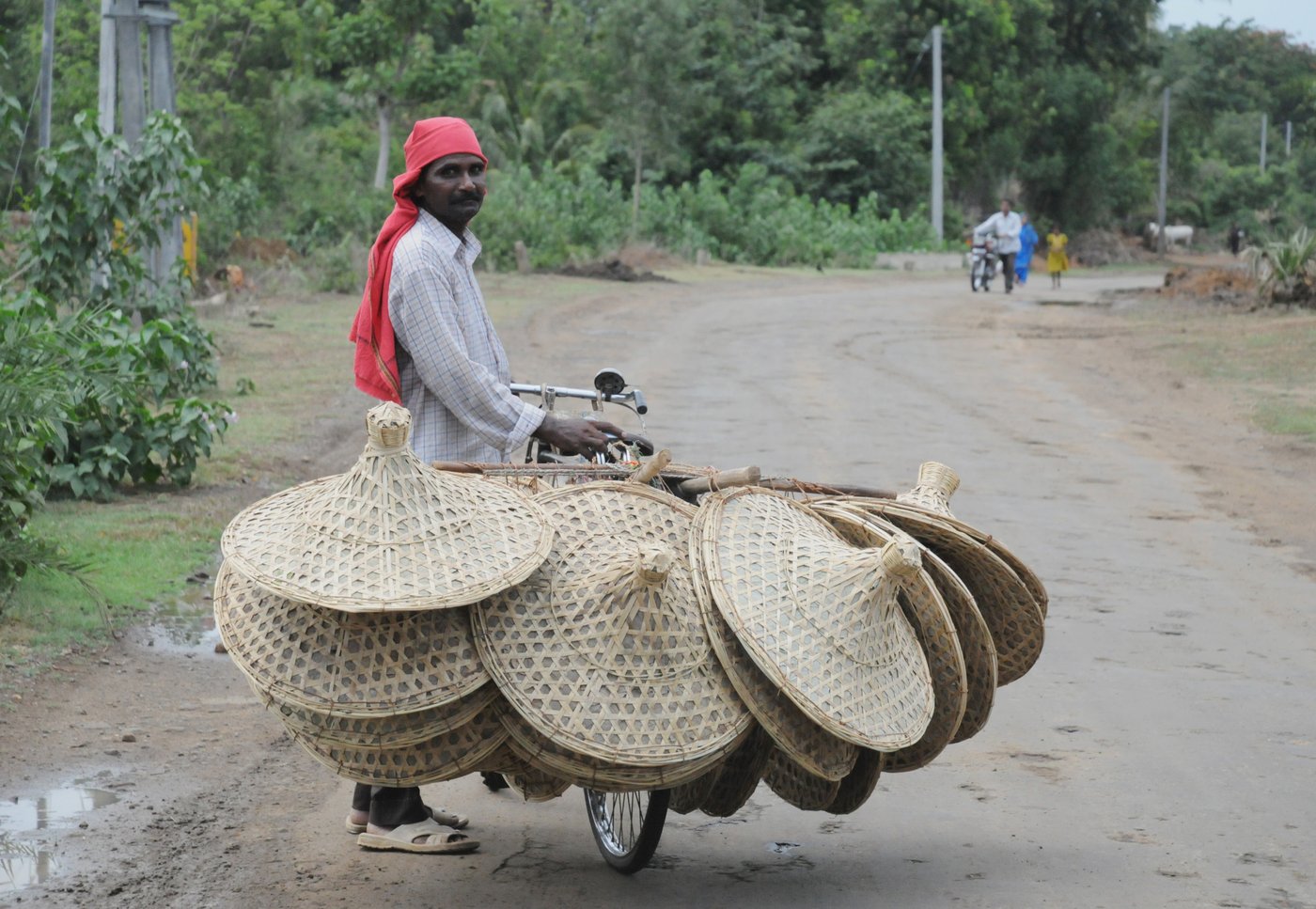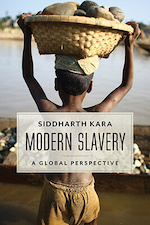
Make in India – with bamboos and leaves
Farmers, labourers and shepherds in rural Odisha wear delicately woven ‘rain hats’ while working. Made by Adivasis, they’re sold by small vendors, who carry them on bicycles across long distances […]
Source: P. Sainath in “Make in India – with bamboos and leaves”
URL: https://ruralindiaonline.org/articles/make-in-india—with-bamboos-and-leaves/
Date visited: 5 September 2020
A normal where billions lived in hunger in a world bursting with food. In India, as of July 22, we had over 91 million metric tons of foodgrain ‘surplus’ or buffer stocks lying with the government – and the highest numbers of the world’s hungry. […]
315,000 farmers took their own lives between 1995 and 2018, as the numbers (huge underestimates) of the National Crime Records Bureau show . Millions either became agricultural labourers or migrated out of their villages – since many allied occupations had also died – in search of jobs. […]
The new normal is the many millions marching back in search of those livelihoods that we destroyed these past three decades. […]
In state after Indian state, labour laws have been suspended or simply violated. The gold standard of labour law – the 8-hour day – has been scrapped in states that have made it a 12-hour day. In some states, that additional four hours come without payment of overtime. The state of Uttar Pradesh also suspended 38 existing labour laws to strangle any possibility of either organised or individual protest. […]
Source: P. Sainath in “We Didn’t Bleed Him Enough”: When Normal is the Problem (counterpunch.org , 12 August 2020, first published in Frontline magazine)
URL: https://www.counterpunch.org/2020/08/12/we-didnt-bleed-him-enough-when-normal-is-the-problem/
Date visited: 20 March 2021
[Bold typeface added above for emphasis]
Photo and video recommendation: a voice from rural India worth being heard
Whether you plan a visit or seek to learn more about India’s rural life – perhaps inspired by the Gandhian social movement or Rabindranath Tagore – explore “a living journal, a breathing archive” in the Adivasi category of PARI: the People’s Archive of Rural India initiated by distinguished photo journalist-turned-activist P. Sainath, continually enriched by stories from all over India.
“In less than 200 years, photography has gone from an expensive, complex process to an ordinary part of everyday life. From selfies to satellites, most of the technology we use and spaces we inhabit rely on cameras. […] While photographic documentation can aid in shaping history, it can also be a window into the horrors of the past.” – Read more or listen to Butterfly Effect 9 – The Camera on CBC Radio Spark 26 May 2023 >>
MODERN SLAVERY IN INDIA >>
Estimated number living in modern slavery: 11,050,000 (8.0 per thousand)
“Modern slavery takes many forms and is known by many names. Essentially, it refers to situations of exploitation that a person cannot refuse or leave because of threats, violence, coercion, or deception. […] Modern slavery is inextricably linked with global challenges such as climate degradation, gender inequality, COVID-19, and conflict. […] The adverse impacts of climate change magnify other drivers of displacement such as loss of livelihoods, poverty, food insecurity, and a lack of access to water and other resources, pushing people to migrate and exposing these vulnerable populations to modern slavery. […] An estimated 5.4 million children worldwide live in orphanages and other institutions.” – https://www.walkfree.org/global-slavery-index/ (Date accessed: 11 April 2024)
WOMEN AND GIRLS
Women and girls are disproportionately affected by modern slavery. As they transition through childhood, adolescence and adult life, the impacts of discrimination multiply and gender inequality grows.

Video lessons on Human trafficking >>
Tip: check the latest figures and reports published by the Walk Free Foundation >>
Walk Free uses cutting-edge prevalence estimation techniques including nationally-representative surveys in partnership with Gallup, risk-model extrapolation and multiple systems estimation to measure modern slavery globally. We also assess government responses to this issue and vulnerability structures that impact populations around the world >>
Hundreds of millions of people today are highly impoverished and disadvantaged by virtue of ethnic or gender identity. These and other forces render them highly vulnerable to false offers by human traffickers. […] In fact, we still do not know to what extent global supply chains are maintained by slavery and child labor. Because of these and other factors, slavery today is more profitable than ever before, and also more woven into the global economy than ever before.
Source: Siddharth Kara interviewed by Katie Gibsoni: Quick, cheap and vulnerable: Siddharth Kara on the persistence of modern slavery, 12 October 2017, Harvard Kennedy School (Faculty and Research)
Date accessed: 6 May 2023
URL: https://www.hks.harvard.edu/research-insights/policy-topics/human-rights/siddharth-kara-persistence-modern-slavery
Siddharth Kara, Director of the Program on Human Trafficking and Modern Slavery at Harvard Kennedy School and author of three books: “Bonded Labor: Tackling the System of Slavery in South Asia”; “Modern Slavery,” and “Sex Trafficking: Inside the Business of Modern Slavery” | Read the full interview titled “Quick, cheap and vulnerable: Siddharth Kara on the persistence of modern slavery” >>
“The transformation of the global slave trade from a high-cost, slow-recruitment business to a low-cost, rapid-recruitment one is driving criminal interest in trafficking and slavery, which is why it is permeating every corner of the global economy. […] For the past quarter of a century, the global economy has brought many benefits to the world through greater flows in goods, capital and people. But the poorest of the poor have increasingly become an exploited labour class toiling in murky factories, mines and fields to feed our insatiable appetites. In this way, we are all shareholders in a system of slavery found in numerous global supply chains. We must ask ourselves how much longer we will look the other way while millions toil in slave-like conditions to provide us with the goods and services we consume.” – Siddharth Kara | Read more and watch a video interview with Siddharth Kara published by The Guardian >>